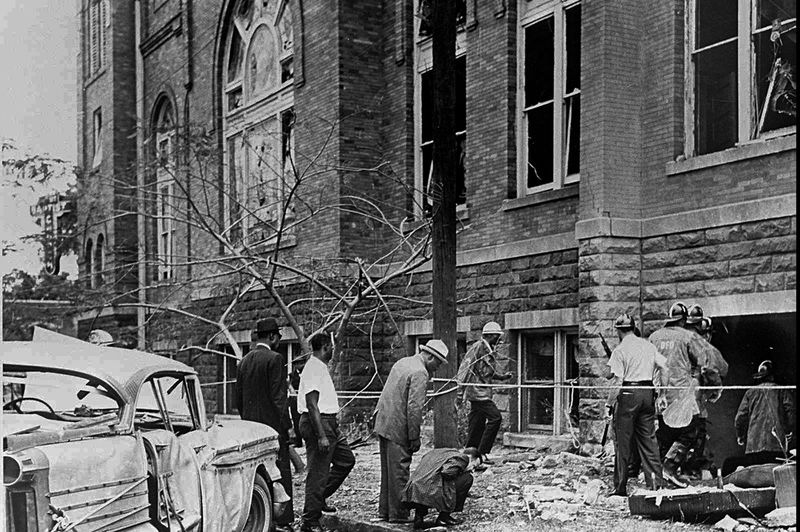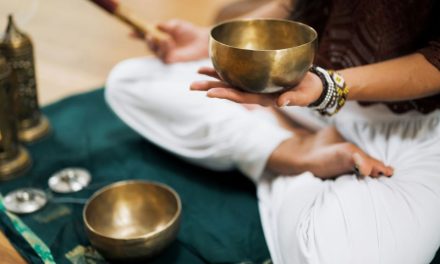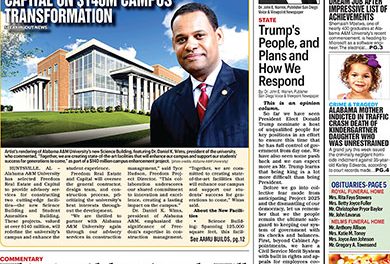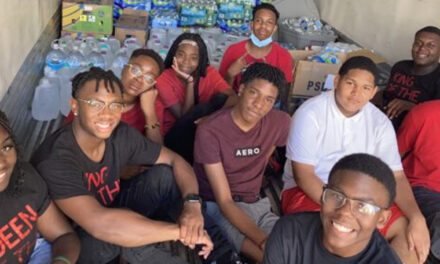This is an opinion column.
Stop, at 10:22 this morning. And remember. If you can’t remember, imagine.
Five young ladies – they’re often recalled as little girls, but they seem ladies to me – taking a moment before a worship service to freshen up in the basement lounge.
Sarah Collins washed her hands. Addie Mae Collins tied the sash on Denise McNair’s dress. Cynthia Wesley and Carole Robertson chatted by a window.
Then the noise. A click, or maybe a snap. Whichever, it was loud enough for people upstairs to wonder what it was.
Then the explosion. Stained glass shattered. Bricks crumbled. And the young ladies. Oh my God, those young ladies.
Sarah, the youngest, at 10, would survive, maimed. Addie Mae, Denise, Cynthia and Carole were dead. Victims of hateful bombers who would not be caught for decades because they were not really pursued for decades.
Victims of Alabama racism, of callousness to the human value of people with dark skin. Victims of Alabama politicians who pandered to the very worst of human nature for votes and power. Victims of a city that had seen 40 racially motivated bombs over the last two decades, of a police force that had solved none of them. Not a single one.
That same day – 60 years ago today – a Black teenager named Johnny Robinson was killed by a shotgun blast from a member of Birmingham’s all-white police force. A 13-year-old named Virgil Ware was shot off the handlebars of his brother’s bike by a young, white segregationist.
In a year in which at least 15 Black men were killed by police in the city of Birmingham, almost all summarily dismissed as justifiable. In a decade when 100 Black men would be shot by police, with no punishment for the killers.
It was a world both recent and foreign, where city ordinances made it illegal for Black and white people to play checkers or dominoes together. Or basketball or football or pool or just about anything else.
No lunch together. No gathering together. No meeting together and damn sure no dating or marriage. Two worlds.
Alabama leaders – and a whole lot of people who supported them – would blow up those worlds to keep them from colliding.
It was a place, a time, where people were so resistant to the “mixing” of races that police poured cement into holes on golf courses rather than to allow integration. They shut down public pools rather than let Black people swim in them.
Gov. George Wallace had schools surrounded to prevent court-ordered integration. Birmingham Police Commissioner Bull Connor looked the other way as Freedom Riders were beaten at a Birmingham bus station.
They encouraged white outrage, and discouraged conscience.
And four young, innocent ladies were killed. Sarah Collins – now Sarah Collins Rudolph – suffered for decades. Virgil Ware and Johnny Robinson died.
As newspapers hemmed and hawed.
As politicians urged Alabamians to defy the courts.
As preachers twisted words from the Bible to justify discrimination.
As Sunday school children at white churches sang “Jesus loves the little children … red and yellow, black and white,” while ushers stood guard to make sure sanctuaries were for whites only.
A day after the 16th Street bombing – not the last one in the city – a lawyer named Charles Morgan famously called out the silent and the complicit, the people who stood by and accepted the status quo, the overtly racist and those too timid or distracted or speak.
“Every person in this community who has in any way contributed during the past several years to the popularity of hatred, is at least as guilty, or more so, than the demented fool who threw that bomb,” he said.
Of course the martyrdom of those young people 60 years ago helped to change the world. The protest and violent response in Birmingham and later Selma helped pave the way for the Civil Rights Act and the Voting Rights Act, which made so many of these everyday atrocities seem like ancient history.
But it wasn’t so long ago. You can see that past more clearly every day, as politicians and school boards try to hide it.
Alabama has helped decimate the Voting Rights Act, and Attorney General Steve Marshall and Secretary of State Wes Allen are eager to turn back the clocks further.
Alabama politicians continue to push bills to ban “divisive concepts,” and many teachers are made to feel uncomfortable talking about the past. A couple of years ago Alabama’s school board, led by Gov. Kay Ivey, passed a resolution – lest we make white people feel guilt or anguish – that chills the study of our racial history, and the horrors the state condoned.
Which all sounds very much like a past they are trying to hide. And a future we are doomed to relive.
So stop, at 10:22 this morning. Remember. Imagine. Not just what happened then, but your role in this moment. And in our future.












